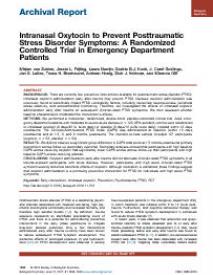Intranasal Oxytocin to Prevent Posttraumatic Stress Disorder Symptoms : A Randomized Controlled Trial in Emergency Department Patients
Abstract
There are currently few preventive interventions available for posttraumatic stress disorder (PTSD). Intranasal oxytocin administration early after trauma may prevent PTSD, because oxytocin administration was previously found to beneficially impact PTSD vulnerability factors, including neural fear responsiveness, peripheral stress reactivity, and socioemotional functioning. Therefore, we investigated the effects of intranasal oxytocin administration early after trauma on subsequent clinician-rated PTSD symptoms. We then assessed whether baseline characteristics moderated the intervention’s effects.
Methods
We performed a multicenter, randomized, double-blind, placebo-controlled clinical trial. Adult emergency department patients with moderate to severe acute distress (n = 120; 85% accident victims) were randomized to intranasal oxytocin (8 days/40 IU twice daily) or placebo (8 days/10 puffs twice daily), initiated within 12 days posttrauma. The Clinician-Administered PTSD Scale (CAPS) was administered at baseline (within 10 days posttrauma) and at 1.5, 3, and 6 months posttrauma. The intention-to-treat sample included 107 participants (oxytocin: n = 53; placebo: n = 54).
Results
We did not observe a significant group difference in CAPS total score at 1.5 months posttrauma (primary outcome) or across follow-up (secondary outcome). Secondary analyses showed that participants with high baseline CAPS scores receiving oxytocin had significantly lower CAPS scores across follow-up than participants with high baseline CAPS scores receiving placebo.
Conclusions
Oxytocin administration early after trauma did not attenuate clinician-rated PTSD symptoms in all trauma-exposed participants with acute distress. However, participants with high acute clinician-rated PTSD symptom severity did show beneficial effects of oxytocin. Although replication is warranted, these findings suggest that oxytocin administration is a promising preventive intervention for PTSD for individuals with high acute PTSD symptoms.
Geachte bezoeker,
De informatie die u nu opvraagt, kan door psychotraumanet niet aan u worden getoond. Dit kan verschillende redenen hebben,
waarvan (bescherming van het) auteursrecht de meeste voorkomende is. Wanneer het mogelijk is om u door te verwijzen naar de bron
van deze informatie, dan ziet u hier onder een link naar die plek.
Als er geen link staat, kunt u contact opnemen met de bibliotheek,
die u verder op weg kan helpen.
Met vriendelijke groet,
Het psychotraumanet-team.
In: Biological psychiatry : a journal of psychiatric neuroscience and therapeutics, ISSN 0006-3223 ; eISSN 1873-2402 | 81 | 12 | june | 1030–1040
http://dx.doi.org/10.1016/j.biopsych.2016.11.012


